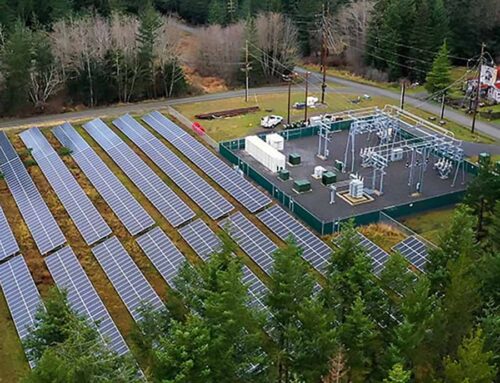Melissa Hortman was a climate and clean energy champion for Minnesota
June 19, 2025

Former Minnesota House Speaker Melissa Hortman is being remembered by advocates and lawmakers as one of the most important climate and clean energy leaders in the state’s history.
From the state’s trailblazing community solar program to the flurry of energy and environmental laws adopted during Democrats’ 2023 trifecta, Hortman had a hand in passing some of the country’s most ambitious, consequential state-level clean energy policy during her two-decade legislative career.
Hortman, who was a Democrat, and her husband Mark were shot and killed in their suburban Minneapolis home Saturday in what authorities say was a politically motivated assassination. The alleged gunman, Vance Boelter, is also charged with attempted murder for shooting Democratic Minnesota state Sen. John Hoffman and his wife Yvette.
Hortman, who was 55 years old, twice tried for a state House seat before finally winning in 2004. Moving through the ranks of House leadership, the attorney served as speaker pro tempore, deputy minority leader, and minority leader before becoming speaker in 2019 and serving in that role for three legislative sessions.
“Clean energy was her first love,” said Michael Noble, who worked with Hortman for more than 20 years during his time as executive director of the Minnesota-based clean-energy policy advocacy organization Fresh Energy. “She really mastered the details and dug deep into climate and clean energy.”
Hortman chaired the House Energy Policy Committee in 2013, a standout year for solar policy in which she helped pass legislation establishing one of the country’s first community solar programs, and also a law requiring utilities to obtain 1.5% of their electricity from solar by 2020, with a goal of 10% by 2030.
“That was the year we put solar on the map,” Noble said.
Community solar advocate John Farrell recalled answering Hortman’s questions in detail concerning the benefits and drawbacks of community solar during meetings. She was preparing to defend the bill and convince others, even Republicans, that it could be something they could support.
“She wasn’t going to tell them something untrue,” said Farrell, who directs the Energy Democracy Initiative at the Institute for Local Self-Reliance, an advocacy group. “She was going to seek reasons why this policy might be something that they would care about or that it might align with their values.”
Nicole Rom, former executive director of the Minnesota-based youth climate advocacy group Climate Generation, said Hortman was committed to educating herself on climate issues. Hortman attended the United Nations’ Conference of the Parties (COP) climate conferences and was part of the University of Minnesota’s delegation at the 2015 Paris climate talks, where her vision for more ambitious state climate goals and policy may have begun to percolate, Rom said.
The result was the strong climate legislation Minnesota accomplished in 2023, Rom said.
“If she never served a day before or a day after the 2023 session, she would still go down in history as an incredible leader,” said Peter Wagenius, legislative and political director of the Sierra Club’s Minnesota chapter.
After Democrats won control of the state House, Senate, and governor’s office in the 2022 election, Hortman understood the trifecta was a rare opportunity that may not arise for another decade, he said.
The following year, Hortman combined her skills and experience as a legislator, committee chair, and political leader to push forward an agenda that would fundamentally transform clean energy and transportation in Minnesota while solidifying her reputation as one of the legislative body’s greatest leaders.
The session’s accomplishments included a state requirement of 100% carbon-free electricity by 2040, along with more than 70 other energy and environmental policy provisions that created a state green bank, funded renewable energy programs, supported sustainable building, and increased funding for transit. Other laws passed that year required the state to consider the climate impacts of transportation projects, provided electric vehicle rebates, revised the community solar program to focus on lower-income customers, and improved grid-interconnection bottlenecks.
When the trifecta arrived, she ensured her colleagues were “ready to move on a whole list of items in an unapologetic way,” Wagenius said. Hortman also practiced “intergenerational respect” by elevating and helping pass laws proposed by first- and second-term legislators, he said.
Democratic Rep. Patty Acomb said Hortman empowered others within the party, made legislators feel they were “like a team,” and had a habit of never taking credit for legislative success. “She shied away from that,” Acomb said.
Acomb, who began serving in 2019, became chair of the House Climate and Energy Finance and Policy Committee four years later. She credits Hortman with that opportunity and with making Minnesota a national leader in clean energy.
“In so many ways, she was a trailblazer,” she said.
Gregg Mast, executive director of the industry group Clean Energy Economy Minnesota, said Hortman followed up on the historic 2023 session with a 2024 legislative agenda that built upon the previous year’s success. The Legislature made the permitting process for energy projects less onerous while passing a handful of other measures promoting clean buildings and transportation.
“She knew that ultimately, to reach 100% clean energy by 2040, we actually needed to be putting steel in the ground and building these projects,” Mast said.
Ben Olson, legislative director for the Minnesota Center for Environmental Advocacy, first met Hortman 20 years ago while lobbying for an environmental bill. He found her to be kind, witty, and pleasantly sarcastic, the kind of legislator who asked questions, closely listened to responses, and offered sage advice. “Everyone liked her, and she was close to everybody who had spent time with her,” he said.
Ellen Anderson, a former Democratic state senator and clean energy champion, remembered when Hortman asked if she could co-teach a course with her on climate change at the University of Minnesota in 2015. Hortman came prepared for classes with notebooks of data and information. “She was super organized,” Anderson said.
Rom thinks Hortman’s love for nature drove her climate and clean energy advocacy. The legislator loved hiking, biking, gardening, and other outdoor activities.
In a blog post for Climate Generation before attending the UN’s 2017 climate conference, Hortman wrote about the impact of climate change on trees and how she had planted nearly two dozen in her backyard to offset her family’s carbon emissions. It was a message not lost on her two children, Colin and Sophie, who suggested in a statement that people commemorate their parents by planting a tree, visiting a park or trail, petting a dog, and trying a new hobby.
“Hold your loved ones a little closer,” they wrote. “Love your neighbors. Treat each other with kindness and respect. The best way to honor our parents’ memory is to do something, whether big or small, to make our community just a little better for someone else.”
Frank Jossi
is an independent journalist and consultant based in St. Paul, Minnesota.
Search
RECENT PRESS RELEASES
Related Post


